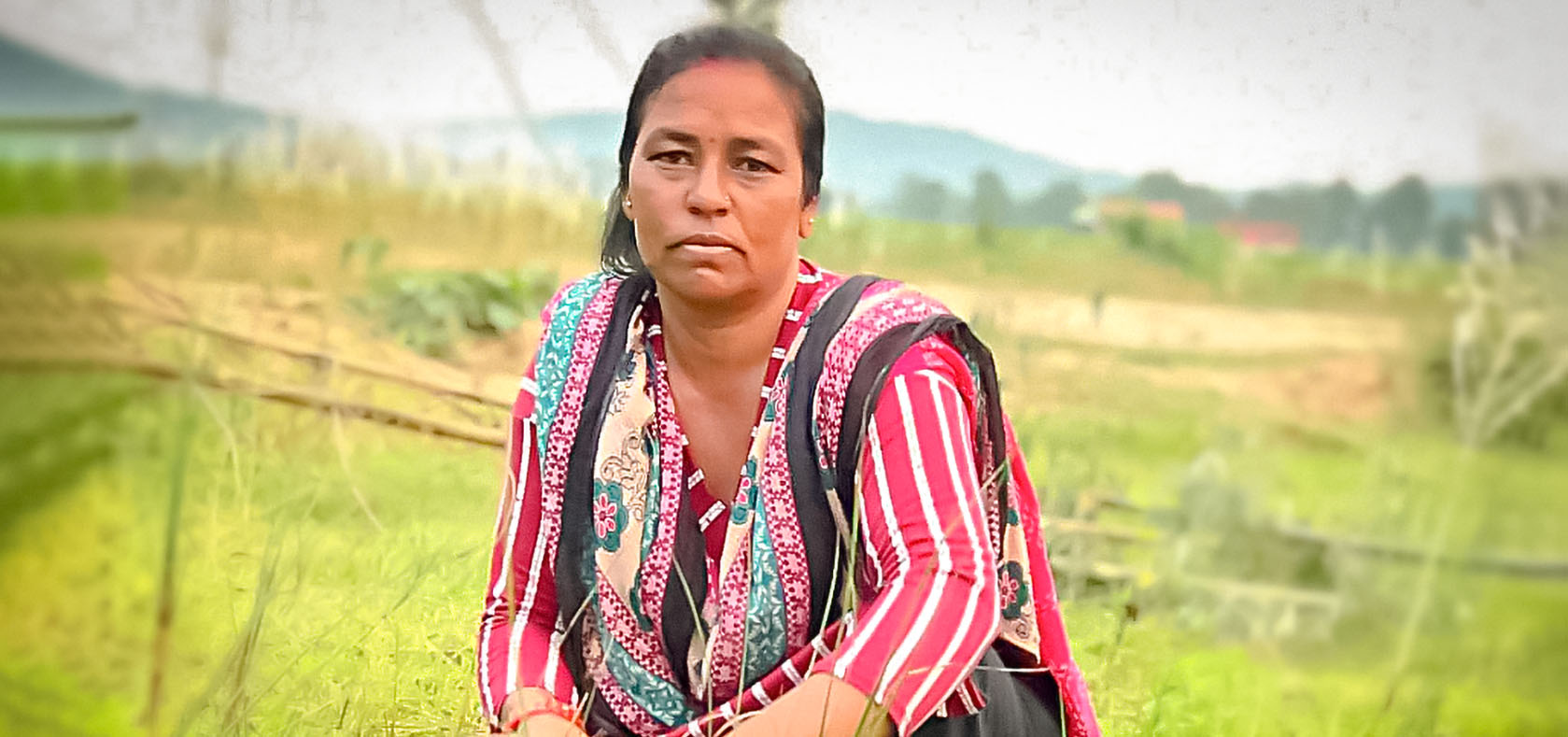Comprehensive relief package provides support to women and excluded groups during the COVID-19 pandemic in Nepal
Date:
Author: Subeksha Poudel

When the Government of Nepal imposed the first nationwide lockdown beginning in March 2020 to prevent the spread of COVID-19, Nirmala Pariyar, from Hetauda, Makwanpur District, could no longer leave her home for work. Forty-year old Pariyar worked as a daily wage farmer in her village with an average monthly income of NPR 7,500 (USD 64) to support her family.
Before the pandemic, Pariyar was able to get food and other essentials on loan from shops in her village and clear the bills when she received her wages, but things became increasingly difficult for Pariyar and her family under lockdown. “Without daily wages, my debts kept adding up. The shops were reluctant to give me more food without money, so my family started cutting down on food,” shares Pariyar.
When Pariyar’s neighbor who works in the local government office informed her that she had been listed to receive UN Women’s comprehensive relief package, Pariyar and her husband rushed to collect it.
Sama Shrestha, Programme Specialist in the Women, Peace, and Security, Humanitarian and Disaster Risk Reduction Programme at UN Women Nepal shares, “A key component of UN Women’s comprehensive relief package is cash-based support that enables individuals who are impaired from earning an income during the COVID-19 pandemic to cope with their immediate survival needs and own money to invest in what is most meaningful for them.” Local governments prioritized the relief package for communities that are often marginalized, including sexual and gender minorities, single women, adolescent girls, women with disabilities, women living with HIV/AIDS, pregnant and lactating women, Muslim women, indigenous women, Dalit women, returnee women migrant workers, sex workers, domestic workers, trafficked women, survivors of gender-based violence, homeless women, women home-based workers, and women involved in wage work and daily labour.
The Humanitarian Country Team’s Cash Coordination Group established a multi-purpose cash assistance value of approximately NPR 2,800 (USD 24) per person and NPR 13,500 (USD 113) per household. However, taking into consideration the intersectional needs of women, UN Women also included four additional cash components: a top up of NPR 200 (USD 1.7) for women needing childcare support, an additional NPR 2,000 (USD 17) for pregnant or lactating women, and an additional NPR 2,000 (USD 17) for women living with disability.
Other components of the comprehensive relief package include access to food, energy, essential supplies, as well as access to information and essential services, such as psycho-social counselling, legal counselling, financial services, and digital services, providing holistic support to participants.
UN Women Nepal, with support from Government of Finland, Fondation Chanel, and UK Aid, has been collaborating with the Ministry of Women, Children and Senior Citizens of Nepal, local governments, World Food Programme, United Nations Development Programme, and civil society organizations Women Act, Mandwi, Feminist Dalit Organization, and WOREC, to provide the packages across Nepal. Since May 2020, more than 3,582 individuals in four of the seven Nepalese provinces have accessed the comprehensive relief package.
“There were so many stressors during COVID-19, but at least we did not have to worry about where our next meal would come from,” Pariyar says. In the first phase of the comprehensive relief package, she received food supplies, cooking gas, fertilizers, and seeds as part of the package. Pariyar was elligable to receive cash support of NPR 13,500 (USD 114), but she lacked the citizenship that is a prerequisite for creating a bank account, necessary to reviece the support.
“In the past every time I wanted to make my citizenship, my husband always asked: Why do you need a citizenship? It’s not like you own any property or you have any income,” shares Pariyar. In Nepal, citizenship is primarily transferred through the father or husband, so it can be challenging for women to establish citizenship without their support.
Priyar was determined to get her citizenship. She could see other women in her village accessing their accounts and investing money in expanding their carts into shops, starting new tailoring business, and registering their home-based shops as small businesses. She travelled to a city two hours away to complete the citizenship process and create a bank account.
When social workers in Pariyar’s community found out that she had successfully secured her citizenship, they urged her to become a part of the Women’s Agricultural Union so that she could take advantage of the group’s loan programme. “I can now access loans from the women’s network whenever I need it,” she says.
“Usually, women accessed their husband’s bank accounts for financial transactions,” shares Binita Pandey, Monitoring and Evaluation Documentation Officer at Women Acting for Transformative Change (Women Act), one of the UN Women’s implementation partners for comprehensive package. There have been changes in family dynamics since women started owning bank accounts and their own money. “We orient women and share recommendations on how to strategically invest money. There have also been a few cases where after providing financial support to the women, their husbands have felt entitled to use the money in the account. In such cases, we have counselled the family saying it is her money, that only she has the full authority to withdraw it and she can choose to invest in her priorities and the family’s wellbeing. We also collaborate closely with the bank to ensure that only the relief package participant can withdraw money from the account and are available anytime should there be an issue,” adds Pandey.
Pariyar is keen to improve her family’s economic situation with the cash support. “I have informed my brothers to keep a few goats ready. I want to buy them as soon as I get the cash,” she said.